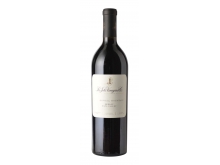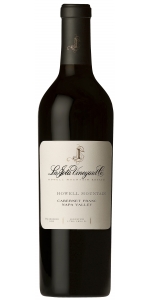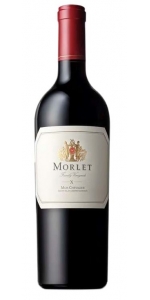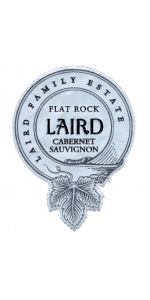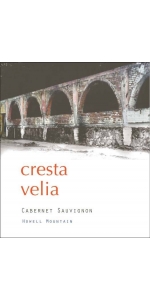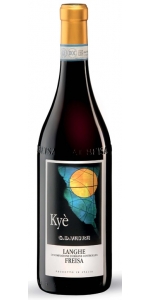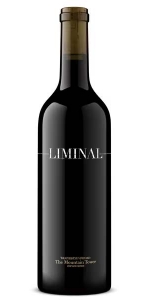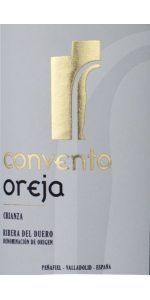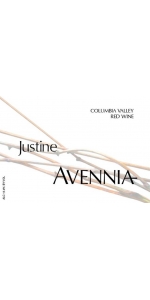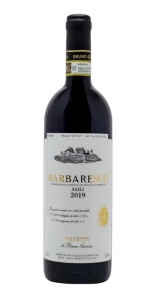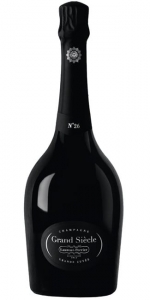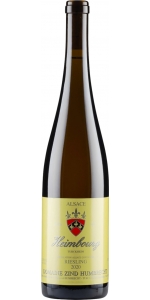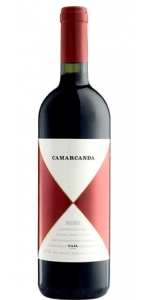La Jota Vineyard Merlot Howell Mountain 2018
| Country: | United States |
| Regions: | California California (Napa) |
| Winery: | La Jota |
| Grape Type: | Merlot |
| Organic: | Yes |
| Vintage: | 2018 |
| Bottle Size: | 750 ml |
La Jota Howell Mountain Cabernet Franc is made from 100% Cabernet Franc.
The 2019 Cabernet Franc opens with aromas of cassis and graphite when poured in the glass. The firm tannins set the stage on the palate melded with rich flavors of boysenberry and pain de grille with a silky mouthfeel and lingering finish.
Review:
Savory in black pepper, smoked meat and cigar box, this wine is high-toned aromatically, with lovely hints of violet and dried herb, sage and bay leaf. Mountain-sturdy tannins give it structure, power and room to age, with lasting acidity to keep it fresh. Enjoy best from 2029–2039
.-Wine Enthusiast 95 Points
Morlet Family Vineyards Mon Chevalier Cabernet Sauvignon is made from Cabernet Sauvignon (86%) Cabernet Franc (8%) Merlot (3%) Malbec (2%) Petit Verdot (1%) .
Located on the hillsides of Knights Valley, near Calistoga, this vineyard benefits from its proximity to Mount St. Helena, whose warm and windy climate is ideal for the long ripening of the Bordeaux red varietals. Handcrafted by using classical winemaking techniques, this special wine is dedicated to our son, Paul Morlet.
Dark red with a hue of purple. Intense and complex bouquet of red, black and blue berries intermixed with notes of blueberries, minerals (graphite, wet river rocks) licorice, fresh blond tobacco and a hint of lavender. Full bodied, the palate is reminiscent of the nose, with a richly tannic yet round frame and a great intensity. The hillside tannins and the classical aromatic complexity create a harmonious ensemble, leading to a very long and elegant finish. Built to age for decades, this collectible wine opens up after a few years of cellaring and is particularly representative of this special vineyard from the hillside of Knights Valley. Mon Chevalier features the interaction of the loamy, well drained and rocky volcanic soil, the typical sunny mountain climate and the low-interventionistic Morlet winemaking approach.
Property Name: Mon Chevalier
Name Meaning My Knight Named after our son, Paul Morlet
Type of wine Vineyard designated
Appellation Knights Valley
Vineyard singularity Morlet Family Estate Hillside 1100-1200 feet elevation Rhyolitic, loam & volcanic ash
Typical harvest date End of October
Picking Manual, small lugs, refer truck
Sorting Cluster by cluster, berry per berry
Fermentation Through native yeast Tank and Puncheons
Upbringing 16 months French oak from artisan coopers
Bottling Unfiltered
Cellaring time Decades
Serving Room temperature
Decanting recommended
Review:
The 2018 Cabernet Sauvignon Mon Chevalier comes from the Knights Valley, just north of Napa Valley in the larger Sonoma County, and it always seems to me to have one foot in Napa and one foot in Sonoma. Boasting a similar ruby/purple color (as do all of the releases here), it’s slightly more reserved and stately (knightly, if you will), with building aromas and flavors of blackcurrants, toasted bread, dried violets, baking spices, and loamy earth. These carry to a pure, full-bodied, multi-dimensional Cabernet that’s flawlessly balanced, has ripe yet certainly present tannins, a notable sense of minerality, and a great, great finish. It’s just another incredible wine from Luc Morlet that can be drunk today with ample pleasure or cellared for 20-30 years if, for some reason, you feel the need to delay gratification.
-Jeb Dunnuck 99 Points
Laird Cabernet Sauvignon Flat Rock Ranch is made from 100 percent Cabernet Sauvignon.
Laird's Flat Rock Ranch vineyard is located near the north corner of where Yountville Cross Road meets Silverado Trail, on State Lane. This prized, complex fruit from the Yountville Appellation is a result of unique geological and meteorological conditions: volcanic soils similar to the adjacent Stags Leap District, but also display ancient coastal deposits, and sedimentary and alluvial soils that provide beneficial stress for our vines. Marine air currents from San Pablo Bay to the south are caught when they reach the "Yountville Mounts," providing a natural cooling effect that balances warm, sunny days that ripen the rich tannins of our hallmark Cabernet Sauvignon to elegant distinction.
Bold violet-red color introduces a captivating bouquet of blueberries, tea leaf, and vanilla. This full-bodied wine has flavors of cassis, hazelnut and briary undertones with fresh acidity and chewy tannins on the palate
Review:
"The 2018 Cabernet Sauvignon Flat Rock is laced with crème de cassis, menthol, lavender, spice and blueberry jam. Inky and plush, the 2018 also has quite a bit of energy backing it all up. The 2018 is a gorgeous wine from Laird.- Antonio GALLONI"
- Vinous (The 2019 Napa Valley Cabernets: A Deep Dive, January 2022), 93+ pts
Early to bud and early to ripen, the 2014 vintage was our third drought year in a row. Dry, even temperatures marched the grapes along at a steady clip all year and created a wine with beautifully integrated fruit, acidity, and tannin.
Dense and dark magenta in color, this is a lithe and energetic vintage with lifted aromatics and a purity of fruit that lights up the medium-bodied tannin structure. The nose promises fresh black fruits, cherries and a touch of graphite, and the palate completely delivers. Juicy blackberry, plum, and bright cherry explode in the mouth, and develop into savory notes of baked black fruit and fresh pencil shavings on the mid-palate.
Eagle Summit Vineyard’s signature eucalyptus appears on the back palate to brighten the fruit, showing fragrant peppermint and warm, toasty spices through the finish. Whether you open it young or wait a few decades, this vintage does Howell Mountain proud--sophisticated and smart, with a rustic wild side.
Cresta Velia Cabernet Sauvignon Howell Mountain is made from 100 percent Cabernet Sauvignon.
Aged in 100% French oak (86% new)
• 100% Cabernet Sauvignon from Eagle Summit Vineyard on Howell Mountain
• Equal amounts of clone 4 and clone 7
• unfined and unfiltered
Review:
"The 2014 Cabernet Sauvignon is 100% Cabernet aged 20 months in 86% new French oak, with the typical suspects in terms of cooperage – Darnajou, Taransaud, and Remond. This opaque purple-colored wine has plenty of mulberry and blackcurrant fruit along with hints of blackberries, camphor and incense. The are some notes of unsmoked cigar and licorice as well. Ripe, medium to full-bodied and luscious, it is a classic to drink over the next 15 or more years. - RP"
- Robert Parker's Wine Advocate (Issue #228, December 2016), 90 pts
G.D. Vajra Freisa 'Kye' Langhe Rosso is made from 100% Freisa.
DESCRIPTION: In 2004, Freisa was discovered to be the closest relative to Nebbiolo, thus explaining the deep bond this variety has with Piemonte and its people. With a noble profile and similar characteristics to the Nebbiolo, we have been bottling a dry Langhe DOC Freisa ever since 1989. Kyé means ‘who is?’ and represents the surprise for this indigenous and forgotten grape.
VINEYARD AND TERROIR: Estate vineyards, the oldest located in San Ponzio, on the lower west border of Bricco delle Viole. This is the closest vineyard to the winery, and a selezione massale planted by Aldo in 1980.
GROWING: In 1971, Aldo Vaira was one of the earliest adopters of organic farming in Piemonte. Vineyards have been nurtured and soil preserved by grassing and cover crop for almost 50 years now. With an incredible ratio of manual work per hectare, farming at Vajra is a labor of love and “recipe-free” attention. Intense research is also placed into monitoring and improving the biodiversity of both flora and fauna not just in the vineyards, but also in the winery fields and forests. The winery is sustainably certified (UNI EN 11233:2009) and will be again fully organic certified since 2019.
Langhe DOC Freisa Kyè displays a beautiful, translucent garnet color. The aromatics are a combination of redcurrant and wild mountain berries, layered with a touch of sweet spices, fresh leather, and candied japonica prune. The mouth is juicy, succulent, with lots -yet never hefty- tannins. There is a beautiful structure in this vintage and a lovely, lovely finish.
Review:
‘The 2018 Langhe Freisa Kyé is quite refined in this vintage and yet it also shows all of the aromatic nuance and complexity that are such signatures of this variety and wine. Dried herbs, rose petal, lavender, mint and spice lend exotic nuance to this deep, beautifully layered Freisa. The Kyé is one of the sleepers of Piedmont's 2018 vintage. It is, quite frankly, ‘as good or better than some Barolos in this tricky vintage. ~- Antonio Galloni
-Vinous 93 Points
Liminal WeatherEye Vineyard The Mountain Tower is made from 40% Cabernet Franc, 33% Cabernet Sauvignon and 27% Merlot.
All three of these blocks lie quite close together on the steep north-facing side of WeatherEye. Here, full ripeness is reached while preserving great varietal character and lively acidity.
Elegant and evocative aromas of red and black currants, dark plum, violet, Ugandan chocolate, wild tobacco, crushed vanilla bean, and dried thyme. Suave and poised on the palate, with beautifully complex black and blue fruit compote, crushed wild roses, clean tilled dark earth, and windblown herbs. This wine, though drinking great now, is still gathering power, and will age gracefully for many years to come.
La Jota Vineyard Merlot Howell Mountain is made from 100 percent Merlot.
Sourced from vineyards with pedigrees dating back to the 1800s, this wine continues to carry the torch of Howell Mountain’s greatness. e aromatics are lifted with plum, huckleberry and minerality leading the way. Bittersweet chocolate and dried herbs add the punctuation to an incredibly long balanced finish.
-Wine Spectator 95 Points
In general, 2018 was a great vintage for this variety, and the deep purple-hued 2018 Merlot is stunning stuff. Lots of cassis, candied violets, scorched earth, and graphite notes give way to a medium to full-bodied, beautifully textured, elegant 2018 with polished tannins, no hard edges, and a great finish. It’s going to evolve for 15 years or more.
- Jeb Dunnuck 95 Points
- James Suckling 95 Points
La Jota Vineyard Co. was founded in 1898 by Frederick Hess, an immigrant from Switzerland, who established a German-language newspaper in San Francisco. No doubt influenced by other European immigrants involved in California's nascent wine industry, Hess purchased 327 acres of a Mexican land grant—Rancho La Jota—on Howell Mountain to plant vineyards. He built the stone winery from volcanic ash rock quarried on the property; his first fermentation tanks also came from the estate, from a stand of nearby coastal redwoods.
The rocky, shallow soils, the abundance of wind and fog, and the remoteness of Howell Mountain terroir were reminiscent of Europe where some of the best wines in the world were being produced. Hess, along with other early pioneers, believed that Napa Valley could achieve the same distinction – and they were right. At the 1900 Paris Exposition, only two years after the winery's construction, La Jota garnered international recognition after Hess won a bronze medal for his "Blanco."
Prohibition effectively ended wine production in the United States and the market for Howell Mountain's superior wines collapsed. Although Prohibition ended in 1933, the damage was already done. A few Howell Mountain wineries attempted to start up again, but none succeeded. Ultimately the wineries were left empty and the region became home to numerous "ghost" wineries. A half-century went by, and in 1974, former oilman Bill Smith acquired the "ghost" La Jota Vineyard Co. and planted vines on the estate. Eight years later, in 1982, the revived La Jota winery was officially bonded. In 2005, California wine pioneer Jess Jackson and his wife Barbara Banke purchased La Jota.
Today, the winery proudly carries on the century-old La Jota Vineyard Co. winemaking tradition, producing small lots of mountain Cabernet Sauvignon, Merlot, Cabernet Franc, and Chardonnay.
There are 28 acres planted across three estate vineyards, each with its own distinct personality. The Hill vineyard is the highest, sunny and steep. The Meadow vineyard is the largest, and the Winery Block vineyard sits next to the original 19th century stone winery. The Winery Block is planted with St. George rootstock, and comprised of unique, phylloxera-resistant Cabernet Franc vines that date back over 40 years.
Convento Oreja Ribera del Duero Crianza is made from 100 percent Tempranillo.
Bright cherry color. On the nose you will find plenty of fruit aromas, well balanced as well as some reminiscences of spices that are appreciable. The oak presence gives elegant hints of black chocolate and vanilla. On the palate, the wine is very smooth and well balanced with the right amount of acidity. Fresh, long lasting and elegant.
The wine went through malolactic fermentation. The wine was aged 12 Months in French Oak barrels. Before bottling, the wine was slightly filtered.
Review:
A bouquet of Luxardo cherry, blackberry preserves and lavender wafts from the glass. Surprisingly juicy on entry, this wine has flavors of pomegranate, ripe cherry, orange zest, dried thyme, dark chocolate and violet. Opulent tannins build in volume and then recede into a finish that is filled with bright fruit notes. — Mike DeSimone
- Wine Enthusiast (June/July 2023), 94 pts
Avennia Justine Red Blend 56% Grenache, 31% Mourvèdre, 13% Syrah
Justine reflects our belief that Washington is capable of producing world class blends of grape varieties traditional to the Southern Rhone region of France. The name is inspired by one of the great heroines of recent literature, who also sprung from the imagination of the Mediterranean. Dark, seductive, complex, with a chasm of depth: The Justine is a great reflection of Avennia's mission of expression, and Washington's generous terroir.
Tasting Note: Big black cherry, blackberry, hints of orange peel, fresh herbs and loam on the nose. Plush and round on the palate. Dark earthy fruits from the Mourvedre, along with citrus high notes, mountain flowers, jasmine, and savory herbs. Balanced and complex without forgetting its hedonistic roots in the Southern Rhone.
Review:
A blend of 56% Grenache, 31% Mourvèdre, 13% Syrah brought up all in older oak, the 2016 Justine offers a great core of black fruits as well as lots of peppery herbs, earth, and classic meatiness. It looks to be a great vintage for this cuvée."
- Jeb Dunnuck (April 2018), 92-94 pts
Falletto di Bruno Giacosa Asili Riserva is made from 100 percent Nebbiolo.
Intense red garnet color with orange highlights. Notes of raspberry and wild strawberry are layered with floral aromas of rose and violet. On the palate, good structure is matched with freshness of fruit and sweet, silky tannins.
Review:
Sweet and succulent aromas of tangerines, freshly cut ripe strawberries, cherries and flowers follow through to a full-bodied palate with sleek and dense tannins that run the length of the wine and then fan out into a dense, vivid finish of fruit. It’s chewy and seriously structured with finesse and energy. Silky texture. This needs at least four or five years to come together and open.
-James Suckling 98 Points
Laurent-Perrier Grand Siecle No. 26 is a blend of 58% Chardonnay, 42% Pinot Noir
white gold in color with delicate and persistent bubbles, Grand Siecle No. 26 offers a very complex nose which mixes honeysuckle, lemon, clementine and fresh butter aromas, followed by notes of hazelnut and a touch of honey. The feel in the mouth is very delicate and fresh with candied lemon and fresh hazelnut aromas. The palate is silky and mineral with notes of honeysuckle, flaked almonds and clementine.
It pairs with high quality produce and refined dishes, including shellfish, noble fish and white meats such as Thai style langoustine tartare and fine roasted poultry.
- 3 exceptional years chosen for their complementarity among the rare Laurent‑Perrier vintages.
- A majority of Chardonnay complemented by Pinot Noir from a maximum of 11 Grands Crus out of the 319 Crus in the Champagne region.
- Aged for 10 years on the lees for the bottle format and a few more years for the magnum format.
Vintage in Champagne is usually synonymous with excellence for Prestige Cuvées. Contrarily, Laurent‑Perrier believes that only the art of assemblage can offer what nature can never provide, that is, the perfect year.
The expression of the perfect year is that of a great champagne wine that has long ageing potential and over time develops depth, intensity and aromatic complexity yet retains its freshness and vibrancy.
Since 1959, Grand Siècle has been revealed only 26 times in bottle format and 23 times in magnum.
The « Grand Siècle » (Great Century) is the name given to one of the most prosperous periods (17th century) in the history of France known for the capacity of man, through his works, to create what nature cannot. Louis XIVth, known as the « Sun King », by creating the « Château de Versailles » and its gardens, was the architect of this model of harmony, balance and perfection.
The symmetry and perspective of the « Jardins à la française », the capacity to grow Mediterranean fruits (especially Oranges inside the « Orangerie ») in such a Northern climate, creating the Grand Canal, the fountains and ponds with no nearby rivers are many illustrations of this ability of man to sublimate natural elements. The name of Grand Siècle was chosen for Laurent‑Perrier’s Prestige Cuvée based on this common vision to reach a perfection that Nature, on its own, cannot provide.
Review:
This is really something. Electric on the palate. The aromas are so complex with sliced fresh and dried ginger, subtle pie crust, tarte tatin and hints of nutmeg with some salted caramel. Toasted bread, too. Always subtle. The palate is full- to medium-bodied yet hemmed-in with a freshness and balance that draws you back. Savory and vibrant. It's full of energy. Spectacular. Fascinating. Symphonic blend of 2012, 2008 and 2007. 65% of the 2012, 25% of the 2008 and 10% of the 2007. Eight grand cru. Chardonnay 58% and 42% pinot noir. Disgorged February 2023. 10 years on the lees. 7g/L dosage.
-James Suckling 100 Points
Domaine Zind-Humbrecht Riesling Heimbourg is made from 100 percent Riesling.
Bright yellow color. The nose expresses an immediate sense of strong mineral and limestone influence. After aeration or decanting, it will show eventually bright citrus, bergamot, spices and an expected slight austerity. It is very expressive today, but it is easy to see that this wine still has much more to show in the future. The mouth is tight, dry, showing a bright acidity and elegant finish.
Review:
What a fascinating peachy, flinty and smoky nose this great dry Riesling has. Power, energy and vitality on the generous palate, but also a profoundly chalky and flinty minerality. Long juicy finish that pulls you back for more. From biodynamically grown grapes. Drink or hold.
-James Suckling 95 Points
Gaja Ca'Marcanda 'Camarcanda' Bolgheri is made from 70% Cabernet Sauvignon & 30% Cabernet Franc .
Color : Deep garnet.Aroma : Initial aromas evoke violet, cassis, dark licorice and a spicy note of black pepper, leading to undertones of aromatic herbs, incense, dried rose petals, clove and cedar.Taste : Sleek and intense on entry with elegant herbal, light black pepper and cassis flavors on the mid palate.
Review:
After Bolgheri’s torrid and parched 2017 growing season, more moder-ate conditions in 2018 brought the vines and their wines shimmering to life. All of the wines at Ca’Marcanda fermented spontaneously in 2018, which Gaia Gaja attributes to the balance in the musts. This wine, a blend of cabernets sauvignon and franc, is taut and energetic, its flavors of crunchy plum and blackberry laced with notes of licorice, tobacco and graphite.
-Wine & Spirits 96 Points
The Ca' Marcanda estate does not make a Bolgheri Superiore, although this bottle would qualify as such. The 2018 Bolgheri Rosso Camarcanda is a blend of Cabernet Sauvignon and Cabernet Franc, and you definitely feel those full-throttle varietal aromas with big intensity and clarity. Spicy greenness comes forward as grilled rosemary and lavender essence, but the wine boasts nice depth and dimension, and enough textual richness to smooth it all out. This was a slightly cooler vintage with some sporadic rain showers throughout the summer. These conditions might explain the sharper side of those Cabernet aromas. As the wine moves over the palate, it reveals more substantial aromas of black fruit, spice and baker's chocolate. This vintage is slightly thinner than the hot 2017 expression before it and the classic 2016. However, this wine should certainly play forward positively in terms of its aging potential.
-Wine Advocate 95 Points
Dense and fluid at once, this red delivers plum, black cherry, licorice, olive, bay leaf and spice flavors. Ripe and balanced, with a lingering, spicy, tobacco-tinged aftertaste. Cabernet Sauvignon and Cabernet Franc. Best from 2023 through 2033. 1,500 cases made, 225 cases imported. — BS
-Wine Spectator 95 Points
- back
Saumaize-Michelin Macon Vergisson Cru Sur La Roche is made from 100 percent Chardonnay.
Harmonious, fresh and clean aromas of fresh apple, lemon, orange blossom, white flower. Pure, crisp, silky and fine texture. Ripe fruit flavors and good acidity.
Thorn Clarke Terra Barossa Cabernet Sauvignon is made from 100% Cabernet Sauvignon
The range is named is named in honor of the rich soils in the region which are a major factor in the Barossa’s reputation as one of the great wine regions of the world.
The wine shows a bright red with a purple hue on release. Lifted blackcurrant balances the fresh herb characters on the nose. A hint of eucalyptus is evident. The palate has bright currant characters throughout. Spice and chocolate add to the complexity of the wine. The tannins are ripe and grainy and give the wine good structure.

